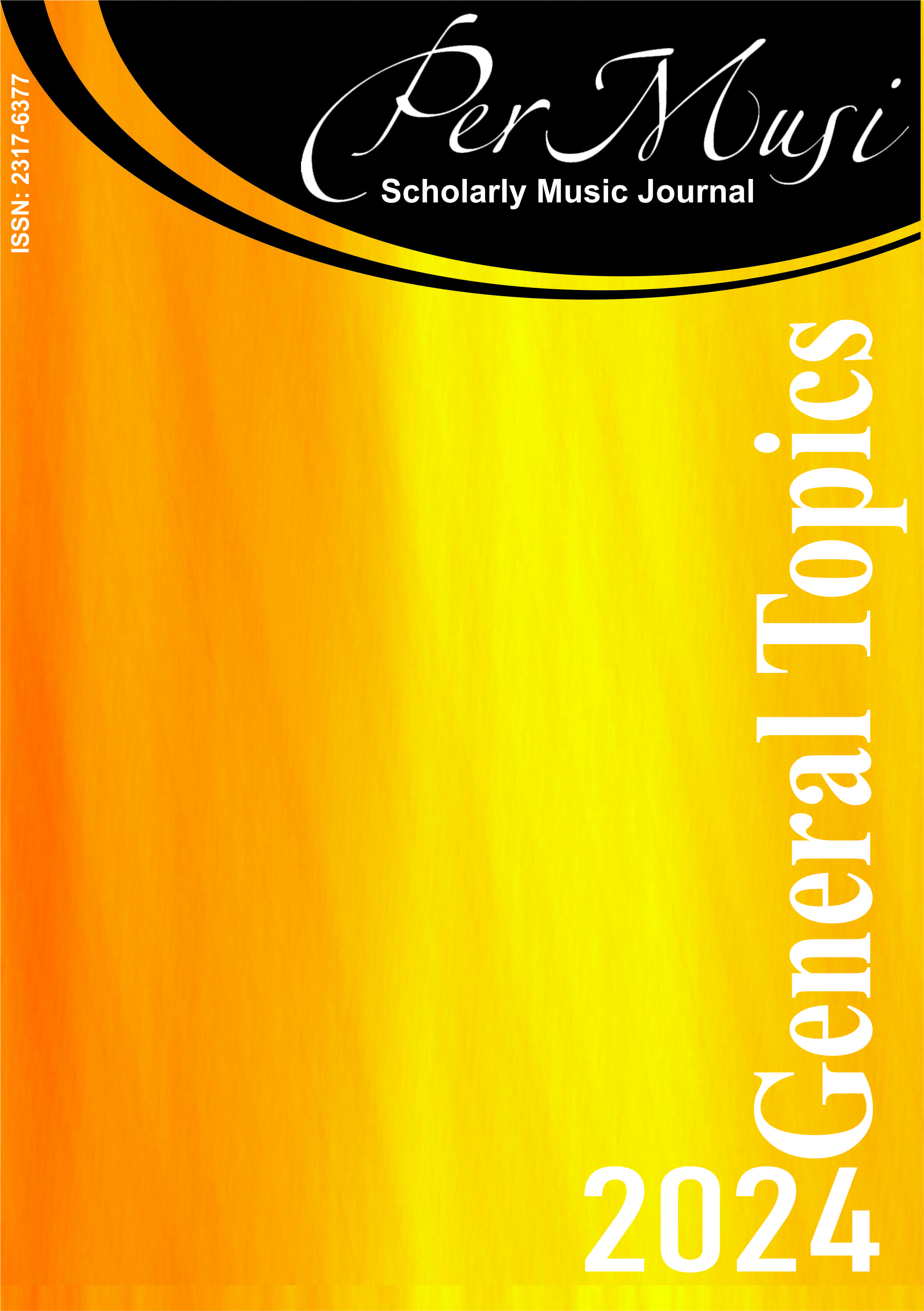Classicismo musical através da gamificação
uma experiência na sala de aula de música do ensino médio
DOI:
https://doi.org/10.35699/2317-6377.2024.46071Palavras-chave:
História da música, Gamificação, Competências essenciais, Ensino Médio, ClassicismoResumo
As atuais diretrizes educacionais nacionais e internacionais destacam a importância do uso de diferentes estratégias metodológicas para o desenvolvimento de competências essenciais ao final da escolaridade obrigatória. Nesse sentido, a gamificação é uma estratégia de ensino que favorece o desenvolvimento de conteúdos e competências essenciais em sala de aula por meio da adaptação de elementos de jogos nas propostas didáticas. Dessa forma, apresentamos a experiência do uso dessa estratégia metodológica para aprender sobre o período histórico do classicismo em duas salas de aula do 3o ano do Ensino Médio Obrigatório. Os resultados obtidos mostram uma boa aceitação e alta motivação dos alunos participantes. Ao mesmo tempo, mostra a possibilidade de investigar com maior profundidade aspectos da análise musical e das áreas de audição e percepção musical.
Referências
Archilla, H. and González, S. (2021). “Beneficios de la gamificación en el aula de música de Educación Secundaria”. ENSAYOS, Revista de la Facultad de Educación de Albacete,36(1), 167-182. http://www.revista.uclm.es/index.php/ensayos -
Balcázar, P., González-Arratia, N., Gurrila, G., y Moysén, A. (2013). Investigación Cualitativa. México: Universidad Autónoma de México
Borges, S., Reis, H.M., Durelli, V.H., Bittencourt, I.I., Jaques, P.A., Isotani, S. (2013). “Gamificación aplicada a la educación: en un mapa sistemático”. En Symp Brasileño sobre Informática en la Educación, 24, 234.
Botella, A.M. and Cabañero, E. (2020). “Juegos y gamificación en las aulas de música de educación primaria”. Edutec Revista Electrónica de Tecnología Educativa, 73, 174-199. https://doi.org/10.21556/edutec.2020.73.1755
Campollo-Urkiza A. and Cremades-Andreu R. (2022). “Contribuciones de la Educación Musical al desarrollo de la Competencia en Comunicación Lingüística en Primaria”. Revista Electrónica Complutense de Investigación en Educación Musical - RECIEM, 19, 51-72. https://doi.org/10.5209/reciem.76647
CAST (2018). “Universal Design for Learning Guidelines”. Walkfield.
Contreras, R., and Eguia, J. (2017). Experiencias de gamificación en aulas. Barcelona: InCom-UAB Publicacions.
Dicheva, D., Irwin, K., and Dichev, C. (2018). "OneUp: Supporting practical and experimental gamification of learning". International Journal of Serious Games, 5(3). https://doi.org/10.17083/ijsg.v5i3.236
García, P.A. (2022). "Proyecto coeducativo basado en la gamificación y el aprendizaje servicio en Educación Infantil y Primaria". Tendencias pedagógicas, 39, 226-240. https://doi.org/10.15366/tp2022.39.017
Homone, A.I. (2021). "Interdisciplinary aspects in organizing the music education lessons". Artes, Journal of musicology,24(1), 252-261. https://doi.org/10.2478/ajm-2021-0015
Johnson, D. W., y Johnson, R. (2017). Joining together: Group Theory and group skills. USA: Prentice Hall.
Kyewski, E. and Krämer, N. (2017). "To gamify or not to gamify? An experimental field study of the influence of badges on motivation, activity, and performance in an online learning course". Computers & Education, 118, 25-37. https://doi.org/10.1016/j.compedu.2017.11.006
Lamoneda, J., González-Villora, S., Fernández-Río, J. (2020). "Hibridando el Aprendizaje Cooperativo, la Educación Aventura y la Gamificación a través de la carrera de orientación". Revista Retos, Nuevas tendencias en educación física, deporte y recreación, 38, 754-760. https://dialnet.unirioja.es/descarga/articulo/7986349.pdf
Ley Orgánica 3/2020, de 29 de diciembre, por la que se modifica la Ley Orgánica 2/2006, de 3 de mayo, de Educación. (BOE nº 340 de 30 diciembre 2020)
Lozada-Ávila, C.,and Betancur-Gómez, S.(2016). "La gamificación en la educación superior: uma revisión sistemática". Revista de Ingenierías Universidad de Medellín, 16 (31), 97-124. https://doi.org/10.22395/rium.v16n31a5
Manzano, A., Rodríguez. J.M., Aguilar, J.M., Fernández, J.M., Trigueros, R., And Martinez, A.M. (2022). "Play and learn: Influence of gamification and game-based learning in the reading processes of secondary school students". Revista Psicodidáctica, 22 (1)., 38-46 .https://doi.org/10.1016/j.psicoe.2021.08.001
Mekler, ED, Brühlmann, F., Tuch, AN, Opwis, K. (2017). "Hacia la comprensión de los efectos de la gamificación individual. elementos sobre la motivación intrínseca y el rendimiento". Computar en Comportamiento Humano. ,71, 525–534.https://doi.org/10.1016/j.chb.2015.08.048
Monreal, I. M. and Berrón , E. (2019). "El aprendizaje basado en proyectos y su implementación en las clases de música de los centros de Educación Primaria". Revista Electrónica Complutense de Investigación en Educación Musical, 16, 21-41. https://doi.org/10.5209/reciem.64106
OCDE (2019). "Estrategias y competencias de la OCDE 2019.Competencias para construir un futuro mejor". Fundación Santillana.
Ortiz-Colón, A.M., Jordán, J., and Agredal, M.(2017). "Gamificación en educación: una panorámica sobre el estado de la cuestión". Educação e Pesquisa, 44. http://dx.doi.org/10.1590/S1678-4634201844173773SECCIÓN: ARTÍCULOS.
Recomendación Del Consejo De 22 De mayo DE 2018 relativas a las competencias clave para el aprendizaje permanente (2018/C189/01). Diario Oficial de la Unión Europea de 4 de junio de 2018.https://eurlex.europa.eu/legalcontent/ES/TXT/PDF/?uri=CELEX:32018H0604(01)&from=ES
Rodriguez-Torres, A.F., Cañar-Leiton, N.V., Gualoto-Andrango, O.M., Correa-Echeverry, J.E., and Morales-Tierra, J.V. " Los beneficios de la gamificación en la enseñanza de la Educación física: revisión sistemática". Dominio de ciencias,8, 642-661. https://doi.org/10.23857/dc.v8i2.2668
Sánchez, C. L. (2019). "Gamificación en la educación: ¿Beneficios reales o entretenimiento educativo?". Revista Docentes 2.0, 7(1), 12–20. https://doi.org/10.37843/rted.v7i1.5
Smiderle, R., Rigo, SJ, Marques, LB ., Peçanha de Miranda,J., Jacques,P.A. (2020). "El impacto de la gamificación en el aprendizaje, el compromiso y el comportamiento de los estudiantes en función de sus rasgos de personalidad". Aprendizaje inteligente. Reinar. (7) , 3 . https://doi.org/10.1186/s40561-019-0098-x.
Stake, R.(2010). Qualitive research: studying how things work. Guilford Publications.
Werbach, K. and Hunter, D. (2012). For the win. How game thinking can revolutionize your business. Wharton Digital Press
Downloads
Publicado
Edição
Seção
Licença
Copyright (c) 2024 Per Musi

Este trabalho está licenciado sob uma licença Creative Commons Attribution 4.0 International License.

Exceto onde está indicado, o conteúdo neste site está sob uma Licença Creative Commons - Atribuição 4.0 Internacional.












